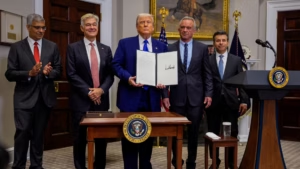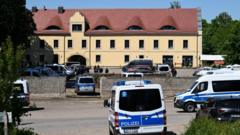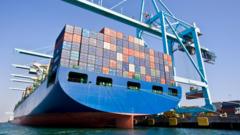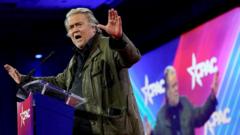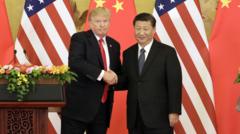Prominent figures such as Germany's Chancellor Olaf Scholz and France's Emmanuel Macron express concern as Musk supports far-right movements and intervenes in domestic affairs.
**Musk's EU Political Interference Sparks Backlash from Leaders**
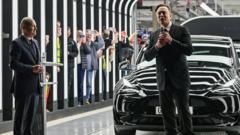
**Musk's EU Political Interference Sparks Backlash from Leaders**
European leaders react to Elon Musk's politically charged social media activity, criticizing his influence ahead of crucial elections.
In a growing controversy, numerous European leaders are voicing their discontent over Elon Musk’s political meddling through social media. Germany's Chancellor Olaf Scholz has been one of the most affected by Musk's pointed remarks, which have included branding him an "incompetent fool" and suggesting he step down from his position. On Thursday, Musk plans to further his influence by spotlighting Alice Weidel, the leader of Germany’s far-right and anti-immigrant AfD party, during an extensive discussion on his platform X.
The timing of Musk’s engagement has raised alarm for many German politicians, especially as the AfD is currently polling second ahead of Germany's federal elections scheduled for February 23. Scholz responded to the provocations with the phrase, "You have to stay cool. Don't feed the troll." Meanwhile, European leaders like Italy's Giorgia Meloni have embraced Musk’s overtures, contrasting with the backlash from others who are finding it difficult to overlook his impact.
Amidst a flurry of social media activity, four governments across Europe have voiced objections to Musk’s online behavior. French President Emmanuel Macron remarked on the phenomenon, noting the unprecedented situation of a major social media owner supporting international far-right movements and directly influencing elections in Europe. Norwegian Prime Minister Jonas Gahr Store echoed this sentiment, highlighting the concern over Musk's substantial resources intersecting with foreign affairs.
In Spain, government spokesperson Pilar Alegría called for digital platforms like X to maintain political neutrality and not interfere in elections. Musk has sparked significant discourse by drawing attention to crime statistics in various countries, including Norway and Spain, and controversially attributing a tragic attack in Germany to "mass unchecked immigration."
The UK Prime Minister, Keir Starmer, criticized those spreading misinformation but did not directly mention Musk, amidst concerns of political chaos as MPs prepare for a potential election in 2025. While leaders from countries like Italy and Hungary maintain friendly relations with Musk, the German political arena remains tense due to his interference—especially after he described the AfD as Germany's "last spark of hope."
Scholz's calm approach contrasts sharply with the stance taken by the Green party's Robert Habeck, who bluntly declared, "Hands off our democracy, Mr. Musk." The leader of the liberal FDP, Christian Lindner, suggested Musk's actions might aim to weaken Germany strategically. Additionally, Thierry Breton, a former EU digital chief, warned that Musk’s upcoming chat with Weidel might advantage her significantly during the elections.
Despite scrutiny, the EU Commission has indicated that there are no existing rules against live streaming or expressing personal opinions online, although they’re examining Musk's platform for unequal treatment. Meanwhile, Musk's outreach is not limited to Germany; recent reports indicated that Italy may be negotiating with Musk's SpaceX for a multi-million dollar deal related to internet security services. This, however, has raised concerns among opposition politicians, emphasizing the risks of giving such sensitive contracts to Musk while he reportedly supports far-right movements in Europe.
As these developments unfold, the intersection of business influence and political discourse continues to be a pressing issue across European borders.
The timing of Musk’s engagement has raised alarm for many German politicians, especially as the AfD is currently polling second ahead of Germany's federal elections scheduled for February 23. Scholz responded to the provocations with the phrase, "You have to stay cool. Don't feed the troll." Meanwhile, European leaders like Italy's Giorgia Meloni have embraced Musk’s overtures, contrasting with the backlash from others who are finding it difficult to overlook his impact.
Amidst a flurry of social media activity, four governments across Europe have voiced objections to Musk’s online behavior. French President Emmanuel Macron remarked on the phenomenon, noting the unprecedented situation of a major social media owner supporting international far-right movements and directly influencing elections in Europe. Norwegian Prime Minister Jonas Gahr Store echoed this sentiment, highlighting the concern over Musk's substantial resources intersecting with foreign affairs.
In Spain, government spokesperson Pilar Alegría called for digital platforms like X to maintain political neutrality and not interfere in elections. Musk has sparked significant discourse by drawing attention to crime statistics in various countries, including Norway and Spain, and controversially attributing a tragic attack in Germany to "mass unchecked immigration."
The UK Prime Minister, Keir Starmer, criticized those spreading misinformation but did not directly mention Musk, amidst concerns of political chaos as MPs prepare for a potential election in 2025. While leaders from countries like Italy and Hungary maintain friendly relations with Musk, the German political arena remains tense due to his interference—especially after he described the AfD as Germany's "last spark of hope."
Scholz's calm approach contrasts sharply with the stance taken by the Green party's Robert Habeck, who bluntly declared, "Hands off our democracy, Mr. Musk." The leader of the liberal FDP, Christian Lindner, suggested Musk's actions might aim to weaken Germany strategically. Additionally, Thierry Breton, a former EU digital chief, warned that Musk’s upcoming chat with Weidel might advantage her significantly during the elections.
Despite scrutiny, the EU Commission has indicated that there are no existing rules against live streaming or expressing personal opinions online, although they’re examining Musk's platform for unequal treatment. Meanwhile, Musk's outreach is not limited to Germany; recent reports indicated that Italy may be negotiating with Musk's SpaceX for a multi-million dollar deal related to internet security services. This, however, has raised concerns among opposition politicians, emphasizing the risks of giving such sensitive contracts to Musk while he reportedly supports far-right movements in Europe.
As these developments unfold, the intersection of business influence and political discourse continues to be a pressing issue across European borders.


